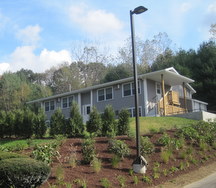| housing needs assessment: overview |
| Using the Assessment Guide The Housing Needs Assessment Guide is designed for use by people with varying backgrounds, including citizens who may have little or no prior experience in the housing field, as well as municipal staff and other housing and planning professionals. Community members can use the tools to identify housing opportunities and evaluate how well they meet the need for a particular type of housing. If the community has a housing production plan approved by the Department of Housing and Community Development, some of this information should be readily available in that plan. To find out whether your community has an approved housing production plan, go to http://www.mass.gov/hed/community/40b-plan/housing-production-plan.html |  Cady Brook, Photo courtesy of Massachusetts Housing Investment Corporation (MHIC) |
| Much of the baseline information needed to answer housing needs questions can be found in data provided by the U.S. Census or its counterpart, the American Community Survey. What Questions to Ask and the Data Collection Templates are set up to use with each of the needs categories you may want to analyze, including:Affordable Rental Housing, Affordable Homeownership, Senior Housing, and Special Needs Housing. What follows is a series of questions commonly asked by | Data Collection Templates: |
Click on the links below to learn more about conducting a housing needs assessment:  What Questions to Ask What Questions to AskAsk questions that will enable you to understand your community’s housing needs.  Accessing the Information Accessing the InformationLearn how to access the main sources of demographic, economic, and local market information.  Analyzing the Information Analyzing the InformationPut the relevant information that you have collected in the proper perspective.  Moving from Information to Action Moving from Information to Action Take concrete steps toward meeting your community's housing needs. Go back to learn about other policies in the Massachusetts Toolkit |